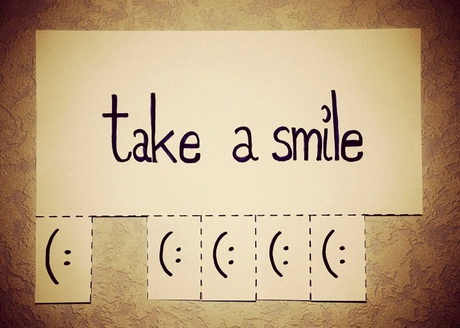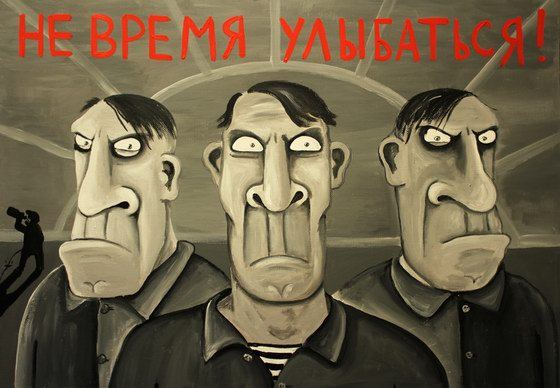
Many foreigners visiting our country wonder about grumpiness and moodiness of Russians. The Village decided to set the record straight and explain why Russians were not used to smiling. Comments were given by Joseph Sternin, DLitt, director of communicative research center for Voronezh State University, author of the paper “A Smile in Russian Communicative Behavior”.
Russians are almost never smiling, because it is related to the special functions of Russian smile. These functions set them apart from the smile in Western and Eastern countries.
1. Russian smile is usually performed by lips only. Demonstration of upper and lower teeth while smiling, as is done by Americans, is considered distasteful and blatant. This kind of smile is usually referred to as “grin” or “horse smile”.
2. Smiling in communication between Russians couldn’t be seen as the sign of politeness. Between Americans, Englishmen or Germans the smile sends an important signal about courtesy. That’s why it’s mandatory while greeting or during the conversation.
This fact was frequently pointed out by Russian writers. In the East the situation is the same. For instance, in China there is a saying: “Those who can’t smile will not be able to open the shop”. In large department stores in Japan girls standing by the moving staircases should smile and bow to every visitor setting foot on the escalator. Approximately it’s 2 500 smiles and bows a day. Polite smile in some cultures is used to prevent the person you are talking to from becoming upset. For instance, Russian novelist Ilya Erenburg wrote about the Chinese who told him about the death of his wife with a smile. But that was a smile telling us “You don’t have to be upset. This is my grief”.
In Russian communicative behavior the polite smile or the smile out of politeness is not considered respectable. If anything, the Russian can interpret such smile cautiously or even hostile. Russian expression “He smiled out of politeness” carry disapproval of the person smiling. Permanent polite smile is called in Russia “ritual smile” and shall be considered an unpleasant trait of the person.
3. In Russia it’s very uncommon to smile at strangers. That’s why salespersons rarely smile at shoppers, because they are not acquainted.
4. Russians are not used to mechanically response to the smile with their own smile, even if it’s the person you’re familiar with. This is rather considered as the invitation to get in touch with.
5. In Russia people rarely smile to the person if you accidentally meet his or her eye. Our people will rather look away, and Americans will smile in return. The smile of the person in Russia is regarded as the signal of personal liking. It demonstrates that the person smiling likes the other person. That’s why when the stranger smiles at the Russian the latter could ask: “Do we know each other?”
6. Russians are not used to smile while performing duties or important task. Customs officers, salespersons and waiters almost never smile. This is also uncommon for children to smile while studying.
7. The smile of the person should have a strong reason which in turn should be known to others. Then the person has some kind of right for it in the eyes of society. Some time ago there even was a situation when a college teacher in Russia made a complaint on the rector stating that “He is making fun of her because he is always smiling when meets her”.

Russians have a unique saying missing in other languages. It can be rendered as “laughing without a reason compromises your intellectual aptitude”. One German teacher couldn’t understand the meaning of that saying being interested why one fact resulted from the other.
8. In Russia people don’t smile to buck up the person they are talking to. They are not used to smile in order to bolster themselves. In a Japanese documentary there was a scene where flight attendant was smiling talking about the emergency landing of the aircraft, and after that she had slumped and writhed in hysterics.
9. Russian consciousness sort of requires some time for the smile to happen. It is seen as some independent act of communication which in most cases is needless. This fact is substantiated by such sayings as “Business first, pleasure afterwards” or “One smiles afterwards”.
10. A smile in formal environment and in a company demonstrates good spirits and friendliness. The Englishmen usually wonder why the Russians always smile and laugh at the formal meetings. Here the smile is considered to be the sign of mutual goodwill and agreeable pastime.
11. Russians don’t have clear distinction between smile and laughter. These phenomenon are unified. However the term “smeyatsya” (to laugh) has Common Slavic root and corresponds to other terms in Indo-European languages, such as smietis in Latin, smayaty in Sanskrit and smile in English. And the term “ulybatsya” (to smile) is of Russian origin.
Theoretically domestic inability of Russians to smile could be explained by several reasons. Collectivity of existence in Russia suggests that everyone should know everything about one another. Hence the urge and the habit to come out in the open and make no bones about one’s mood appear. Daily routine of the Russians, particularly bondmen, has been the struggle for existence over the course of centuries. As a result concernment entrenched itself as a standard household mimic. In this respect the smile becomes an exception from the rules. It’s regarded as a sign of welfare, prosperity and good spirits. Not everyone in Russia could afford all this. Such behavior could cause questions, envy and even dislike.


Comments (0)
Twitter
Facebook
Pinterest
E-mail